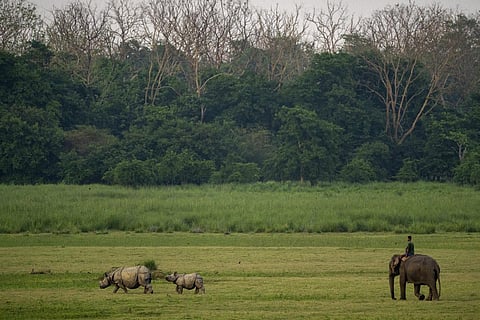

The cell phone rang. Bujji babu, my worker, was calling me.
“Hello, Bujji babu, tell me.”
“Amma, elephants came to our village last night.”
“What!? “Yes, amma, elephants came.” “Oh my God! What did they do?”
“They ate the paddy crops of Balayya and Chandrababu and the tomato crop of Munikrishna; they stamped the fields, broke the fence of Ramakrishnayya’s mango garden and went away!”
“Oh my God! If they come again, don’t throw a stone or any such thing at them. Don’t go anywhere near their sight; if you see them, just slink away and go home.”
I put down the phone and sighed. How can we carry on cultivation in such a situation?
First the wild pigs, then the monkeys and now the elephants! Droughts and floods, we are used to. Irregularity of rains, we know. Climate change is also upon us and we are getting used to the unpredictability. A stray deer or two, or a peacock or peahen, we were happy to catch and make a meal out of them. The wild pigs were relished for their meat. Now all that has been stopped.
The great wildlife policy of the government of India with its crocodile tears for the wildlife has put a stop to killing them and now we are at their mercy! This is the first time elephants have come to our area. In the last few weeks, we had been hearing about elephants’ presence in the neighbouring forest division. If they have crossed and come into our division, that is scary. And if the elephants come for my standing paddy crop to be harvested in a month’s time, that would be `40,000 down the drain, plus four months of effort, and a loss of good organic rice to last for a year or so! I better pray to Lord Ganesha, the God with the Elephant face!
Wildlife menace is prevalent not just in some small select areas; it has become a major problem in many parts of India. Tigers, leopards, lions, elephants, wolf, bears, deer, antelopes, blackbuck, wild cattle, wild boars, and the ubiquitous monkeys. The monkeys have invaded the agriculture areas
Readymade food in the form of fruits - guava, mango, tamarind, banana, sapota, snacks such as ground nut, pulses, green fodder grass, and drinks like tender coconut water are all up for grabs. Monkeys don’t just eat the ripe fruits; they also cut into unripe ones and throw them away! They tear the top fiber of the tender coconuts, drink up the coconut juice and throw away the coconuts!
My coconut garden has around 100 trees and at a minimum of 50 nuts per tree, I should have harvested 5,000 nuts; instead, all I could get through the whole year was about 100-odd coconuts, the rest had been torn down by monkeys. Wild pigs come in the night, and dig up the root crops like groundnut and others, just before harvesting. Elephants are at a different level altogether.
They feed on the crop, stamp out the fields and tear down branches of trees. Farmers living near forests have been coexisting with wildlife for centuries, dealing with them in their own ways. But in the last few decades, dense forests have decreased in the Recorded Forest areas while fruit and vegetable crops have increased in the agricultural areas. It is no surprise that wildlife from forests comes looking for readymade fast food in the form of fruits and veggies in agriculture areas.
The 1972 Wildlife Protection Act allowed the killing of forest animals if they posed a threat to standing crops or human lives, as a measure of self-defence. But not anymore. People have also persuaded themselves that monkeys are Hanumans, and are afraid to kill them. Sterilisation is considered to be a viable method to control the monkeys.
Thailand has experimented with sterilisation of monkeys in one of the tourist cities as they had become violent towards the tourists. Recently, Himachal Pradesh and Sikkim started a sterilisation programme for monkeys. Experts have made several recommendations to curb human-wildlife conflicts. But who is to implement them?
It is unreasonable to expect farmers to take protective measures against them. The forest department should undertake studies to assess the carrying capacity of the forests and wildlife must be culled or sterilised accordingly. But who cares? Politicians are busy with elections; they keep dumping and jumping parties, like monkeys themselves - they are in one party today and another tomorrow! So, happy days are here for monkeys and elephants! Enjoy your fast food!
By Uma Shankari, The author is a farmer, researcher and an activist